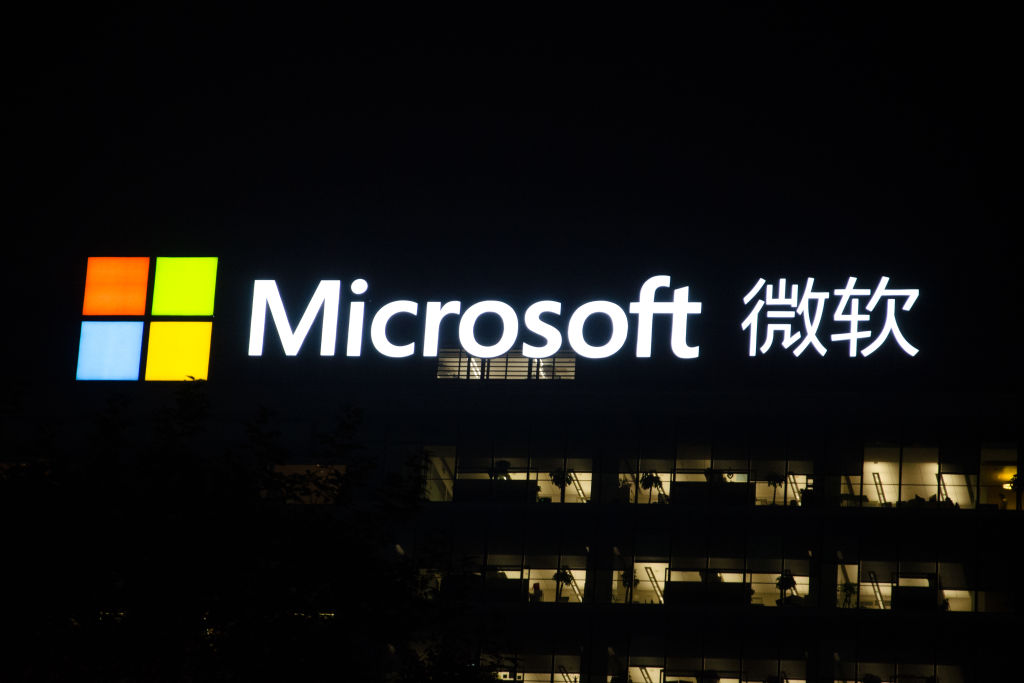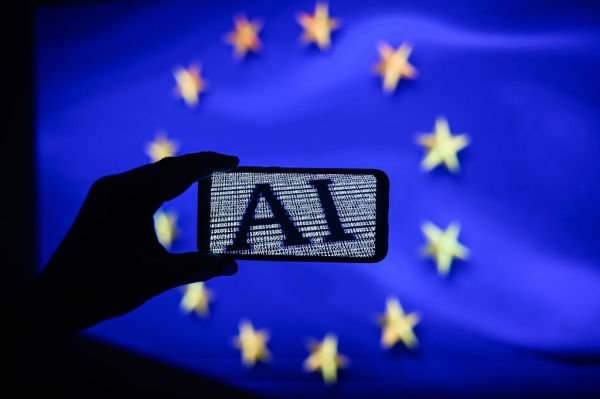Earlier this month Microsoft President Brad Smith published a blog post about the responsible use of artificial intelligence. Smith argued that “we must ensure that AI advances international competitiveness and national security.” He warned about China’s rising importance in the field and said it is imperative that the U.S. advance AI leadership “among other nations committed to democratic values.”
Microsoft’s extensive role in helping develop China’s AI industry went unmentioned in the post. Yet, as relations between China and the U.S. continue to deteriorate, Microsoft’s history of collaboration with Beijing has come under increasing scrutiny—especially given the national-security implications.
American firms have been collaborating with their Chinese counterparts for decades, even as China developed a reputation for pressuring foreign operated companies to share data and intellectual property (or outright stealing information from companies). Microsoft was no stranger to the trend.
Microsoft opened its first office in China more than 30 years ago. It expanded and opened Microsoft Research Asia (MSRA) in Beijing and Shanghai in 1998 and is now the company’s largest research and development center outside the U.S. Today the institute’s more than 300 scientists and engineers conduct “research in areas central to Microsoft’s long-term strategy and future computing vision: natural user interface, artificial intelligence, cloud and edge computing, big data and knowledge mining, computer science fundamentals, intelligent multimedia and computational science.”
“Sometimes firms will say, ‘Well, the cost of doing business in this massive market that is China is agreeing to a lot of the Chinese policies and practices that are required in order to be in that market,’” Roger Cressey, director for transnational threats on the National Security Council from 1990 to 2001, told The Dispatch. “Microsoft has provided source code to the Chinese in the past. I’m not drawing a one-for-one relationship between what’s happened in the past and what’s happening now, but that is something that you’ve just gotta note.”
Chinese President Xi Jinping’s belligerence has led to a rethinking of such relationships. That’s especially true with cutting-edge technology like artificial intelligence, because data and tech sharing between American companies and the Chinese government and companies could have dangerous or immoral consequences.
Take Megvii, a Chinese surveillance company that supplies equipment to officials in Xinjiang, where the Chinese Communist Party invasively tracks members of the Uyghur minority. Megvii reportedly trained its facial recognition software with a public Microsoft database.
Then there’s MSR Asia’s partnership with researchers linked to the Chinese military-run National University of Defense Technology. The scientists worked together on a series of academic papers, one of which was about new methods of tracking through analysis of human faces, which could be used by the authoritarian regime to surveil its citizens.
These are just the beginning of AI’s potential uses in the realm of cybersecurity and defense.
“The mantra that you should have in mind is that human beings make decisions at the speed of biological processes. Computers make decisions at the speed of light,” said Paul Rosenzweig, former deputy assistant secretary for policy in the Department of Homeland Security. “The pace of our response or the pace with which we take advantage of a military opportunity is the difference between success and failure.”
We’re still a little ways off from a future in which AI is fully incorporated into conflict, whether online or in-person. Yet some advances aren’t far off: adaptive hacking programs, computers that develop military strategy, or automated drones that distinguish between different vehicles. AI could also be used to manipulate information.
A comprehensive catalog of what Microsoft shares or has shared with Chinese organizations isn’t publicly available, and a Microsoft spokesperson initially declined to comment. After publication a Microsoft spokesperson said “Microsoft fully complies with U.S. laws—including U.S. export controls and sanctions laws and regulations.”
“If I was in government, I want to see crystal clear Microsoft and other firms who are operating aggressively in China, what’s their data security, data integrity policies, and how are they able to say no to the Chinese if the Chinese ask for X, Y, and Z,” said Cressey.
But some information, even if incomplete, is available. As noted in an article published at tech website Protocol by Kate Kaye, MSR Asia has become “China’s Big Tech alma mater.” She explained: “People who honed their skills at MSRA have moved on to help create and grow some of China’s best-known tech firms driving AI in the country and across the globe.” Former employees from MSR Asia have gone on to serve as vice president at ByteDance’s AI Lab; the chief technological officer of Alibaba, which has developed its own chatbot; and chief scientist for Baidu—the “Google of China.”
AJ Grotto, who served as White House senior director for cybersecurity policy under Presidents Obama and Trump, said in an interview that Microsoft’s relationship with China is “pretty unique.”
“It’s one thing to sell commodity software in China, you know, Microsoft Word,” Grotto continued. “One could write a war plan on Microsoft Word,” but no one is going to use that program in combat. “As Microsoft moves more to the cutting edge I think these problems about responsible corporate behavior become a lot more difficult.
Grotto noted that Apple also “made a large bet in China, but its AI R&D product line is just not as compelling or competitive as some of the other big providers out there.” Amazon, too, expanded its AI team in China last year, even as Amazon CEO Andy Jassy participated in a national commission that issued a report warning that China was primed to overtake the United States as the world’s AI leader.
AI isn’t the only area of industry in which these questions are being asked. In an era of increasing tensions between the United States and China, industries ranging from telecommunications to monkey imports are taking on increased geopolitical significance. Rosenzweig says that the American response has generally been decoupling from China, trying to ensure that we’re not reliant on China or at risk of American businesses supporting our rival in key industries.
“You’ve seen it developed to a large degree, for example, in the CHIPS Act,” said Rosenzweig. “Which is intended to try and decouple chip manufacture, a small part of the tech industry but a critical part, from China and redevelop an independent capacity. We had one, it atrophied, we’re trying to revive it. My expectation is that that theme will play out over and over again.”
What’s the state of the AI race look like right now? Rosenzweig cautioned against viewing it as a straightforward struggle because AI can be used in so many different ways for so many different tasks.
“China probably has a much more robust set of training data than we do because it’s three times as large and it has access to our information—TikTok—whereas we don’t have access to theirs,” said Rosenzweig. “On the other hand, it’s generally thought that free market, free ideas are better at novel innovation.” Grotto concurs: “Our innovation ecosystem, there’s nothing like it in the world.”
In the aftermath of the release of ChatGPT, the most sophisticated AI chatbot to date, many in the Chinese AI industry wondered which environmental factors had made America a more fertile ground for AI advances.
“In 2021, the United States led the world in total private investment in artificial intelligence and in the number of newly funded A.I. companies, which was three and two times the levels in China, according to Stanford University’s A.I. Index 2022 Annual Report,” New York Times columnist Li Yuan noted.
America’s innovative edge may still cut China’s way. Ten percent of American companies’ AI labs are found in China, according to the Center for Security and Emerging Technology at Georgetown University.
“American companies assisting China in the development is kind of dissipating somewhat that generic advantage,” Rosenzweig said. “It’s like Kruschev said, ‘You’ll sell us the rope with which we will hang you.’ I think the Chinese must think the same thing about the investments that IBM and Facebook and Microsoft are making in their AI development.”
Correction: The first Microsoft Research Asia office in China opened in 1998—not 1992, as a previous version of this article erroneously stated.









Please note that we at The Dispatch hold ourselves, our work, and our commenters to a higher standard than other places on the internet. We welcome comments that foster genuine debate or discussion—including comments critical of us or our work—but responses that include ad hominem attacks on fellow Dispatch members or are intended to stoke fear and anger may be moderated.